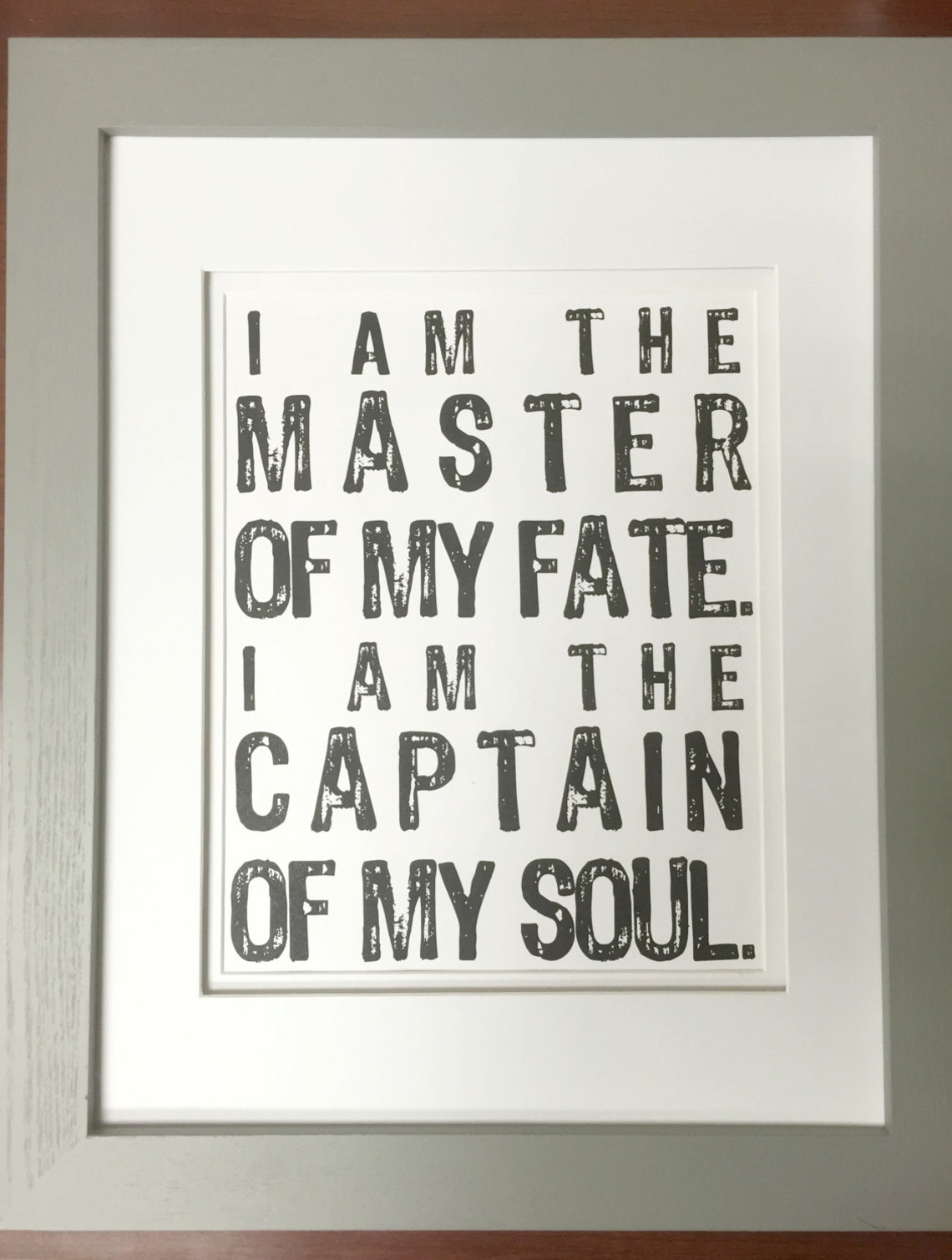

You will lose this token if you switch from Unforgiving to Merciful mode. Game note: You are in Unforgiving mode, with no save slots besides the basic autosave.

Rick Reed is a columnist for the Daily Commercial.""I am the master of my fate: I am the captain of my soul." "

Swindoll found Dorothea Day’s answer to "Invictus," called “My Captain.” It concludes with the words, "Christ is the master of my fate. It is when we surrender to God the can do our most for Him, not that he needs our most. A lady doctor told a male doctor the best thing about control is being able to let go, in another word, surrender. While watching a television show a week or so ago, I came across a line that really is helpful. We won a great many people to the Lord, or our version of Him, but as I’ve read, people artificially won must be artificially kept. It matters not how strait the gate, How charged with punishments the scroll, I am the master of my fate: I am the captain of my soul. It was our efforts that brought people to Christ. Beyond this place of wrath and tears Looms but the horror of the shade, And yet the menace of the years Finds and shall find me unafraid. In our veiled bits of praise for the Father, we were really praising ourselves. No one thought of themselves as humanistic, but we most certainly were. I was a part of a very humanist religious group. While those lines sound good, they are the root of humanism. Invictus himself was an English poet who lived between 18. This inspirational poetry describes a person's struggle with mental and physical obstacles. As we maneuver through these challenging times, let us keep in mind the power of this poem to confront adversity and to come out the other side of it with the creation of positive change. Do I really want to be the master of my fate, the captain of my soul? This renowned phrase, 'I am the lord of my fate, the captain of my soul,' is at the end of one of the finest Victorian-era poems, 'Invictus,' by William Ernest Henley. I am the master of my fate, I am the captain of my soul.
#I am the master of my fate i am the captain of my soul movie
It’s kind of like that war movie that came out in 1945, “God is my Co-Pilot.”ĭo we really want God to be our co-pilot? Doesn’t it make better sense to let God be our pilot and we can be his co-pilot. McVeigh didn’t speak when he was strapped to the gurney, instead he provided a written statement from the poem "Invictus," which ends with the lines: "I am the master of my fate, I am the captain of my soul."Īre we truly the masters of our fate, the captains of our soul? Charles Swindoll doesn’t think so-in fact he considers it heresy. In a Fox News report, Timothy McVeigh was killed by lethal injection for the 1995 bombing of a federal building in Oklahoma City, killing 168. We can decide whether that’s a good thing or not. Over and over the verses of "Invictus" have inspired people. You might remember Nelson Mandela reciting the poem or giving it to Francois Pienaar, the captain of the National South African Rugby team, although he actually gave Pienaar a different text written by Theodore Roosevelt. He wrote “Invictus,” or the verses that would become "Invictus," while recovering from the procedures. He found a surgeon who was able to save the leg after several surgical procedures. In the first stanza, he thanks the Gods, or whatever unknown power it is, that has kept him going despite being thrown into a dark pit by fate. Roughly eight or nine years later he was told he would loss the other leg. William Ernest Henley Meaning of the Poem This is a subtle poem, which effectively gives out a strong message without using bold words. This motivational poem talks about a person’s battle with mental and physical impediments. He lost one of his legs due to complications from tuberculosis. This famous quote, I am the master of my fate, I am the captain of my soul appears at the end of one of the best poems of the Victorian era, ‘Invictus’ by William Ernest Henley. It matters not how strait the gate, How charged with punishments the scroll, I am the master of my fate: I am the captain of my soul. I am the master of my fate, I am the captain of my soul. William Ernest Henley was faced with many obstacles in his life. Under the bludgeonings of chance My head is bloody, but unbowed. Invictus, the Latin word for unconquered was added by editor Arthur Quiller-Couch when the Oxford Book of English Verse was published in 1900, according to Wikipedia. In the fell clutch of circumstance I have not winced nor cried aloud. Originally this poem was published without a title in 1875. When was the first time you read “Invictus,” by William Ernest Hensley? It sounds so right, doesn’t it? “I am the master of my fate, I am the captain of my soul.”


 0 kommentar(er)
0 kommentar(er)
